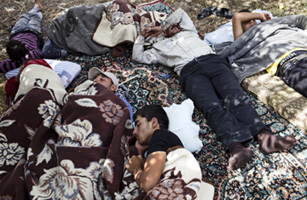
The Syrian colonel sits cross-legged on a patch of moist soil. He’s wearing a borrowed plaid shirt and pale green trousers and is surrounded by dozens of men who fled the besieged northern city of Jisr al-Shoughour to an orchard a few hundred meters from the Turkish border. He says his name is Hussein Harmoush and shows me a laminated military-ID card indicating his name and title. Everyone around calls him muqaddim — Arabic for his rank. A colonel with the 11th Armored Division of the army’s 3rd Corps, the 22-year military veteran says he burned his uniform in disgust more than a week ago, starting with the epaulets. He had to defect, Harmoush says, to take “responsibility for protecting civilians in Jisr al-Shoughour.” His only regret: “I was late in taking this decision. I feel like I am responsible for the deaths of every single martyr in Syria.”
The defection of soldiers like Harmoush represents one of the first visible cracks in the regime of President Bashar Assad since he ordered a brutal crackdown on mostly peaceful pro-democracy protests three months ago. In the most dramatic mutiny yet reported, scores of soldiers were said to have defected in Jisr al-Shoughour on June 5 and used their weapons to defend unarmed protesters. Some 120 security personnel were killed in fighting between defectors and loyalists, according to residents and rights activists. The regime denies the mutiny and says the deaths were at the hands of “armed gangs” wearing stolen military uniforms.
Reports from Syria are hard to verify, in part because foreign journalists are barred. But I managed to get across the Turkish border along steep mountainous terrain to reach thousands of refugees, most from Jisr al-Shoughour, who were huddled in open fields and orchards on the outskirts of the Syrian town of Khirbet al-Jouz. Colonel Harmoush was among them. His conversation with me confirms growing suspicions that the military is not, as the regime claims, foursquare behind Assad.
It’s impossible to know how many soldiers feel as Harmoush does, but even small mutinies are significant for a regime that has long relied upon the absolute loyalty of its military to stamp out any political dissent. That’s what was expected of the 11th Armored: the division was ordered to leave its base in Homs, some 100 miles from Damascus, and “sweep” several northern towns. “We were told that we were doing this to capture armed gangs, but I didn’t see any,” the colonel says. “I saw soldiers indiscriminately shooting people like they were hunting, burning their fields, cutting down their olive trees.”
The refugees crouch in the mud and listen respectfully as Harmoush recounts these horrors. He had been growing disillusioned with the military and the Assad regime for years. A Sunni Muslim, Harmoush says officers from Assad’s Alawite sect were given preference when it came to promotions and that some 85% of places in the officers’ cadet corps were reserved for the President’s co-religionists.
Further proof that the regime was corrupt came from the government’s spin on events in the southern city of Dara’a, where anti-Assad protests first erupted in mid-March. “I know Dara’a. I lived in Dara’a. There are no Salafists or terrorists there. The people of Dara’a were slaughtered,” Harmoush says. He began watching dissident videos, taking care to make sure none of his soldiers saw him. He turned to Arabic satellite-news channels for another perspective than that of the sycophantic Syrian press.
The final straw came on June 3, in the village of al-Serminiyye, when Assad’s tanks began shelling civilians. “I told [my men], ‘I took an oath to protect my people and my country, [and] whoever wants to do the same … follow me. Thirty did immediately.” The soldiers went to Jisr al-Shoughour, where they were joined by others. Soon Harmoush had 120 men, but they were utterly outgunned. “We had light weapons, rifles. The [army] had tanks,” he says. “We set up traps, an ambush. That bought us some time to evacuate civilians.”
After that, Harmoush and his men began helping townspeople trek across the hills toward the safety of the Turkish border 25 miles away. Now he waits with them, unsure of what will come next. He is haunted by the atrocities he saw fellow soldiers commit. When I ask him if any incident stood out, tears quickly well up in his eyes. One man puts his arm around the colonel; others begin to silently sob. Harmoush doesn’t answer the question. Instead, his voice cracking, he makes a plea: “I call on people of conscience, on people with humanity: please help the Syrian people.”
See pictures of protests in Syria.
See “Syria’s Wounded Refugees: Tales of Massacre and Honorable Soldiers.”
